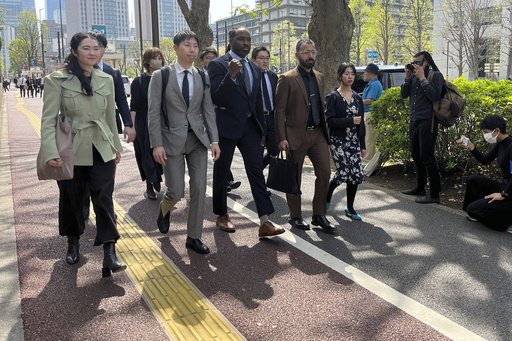TOKYO (AP) — A civil lawsuit accusing Japanese police of racial profiling opened Monday with emotional testimony from plaintiffs who said they were constantly stopped and questioned without good reason.
The case, filed in January by three residents of Japan with overseas ancestry, including an American, claims their treatment constitutes discrimination and violates their human rights.
Japan does not have any anti-discrimination law, nor any laws or guidelines aimed at preventing racial profiling, but the government and the police deny they discriminate and say they are just doing their jobs. They have yet to outline the specifics of their arguments, expected in the next session of court in July. A verdict is expected in about a year.
“We are relaying our feelings, our experiences and our views,” said plaintiff Syed Zain, a Japanese citizen of Pakistani descent, speaking to reporters after appearing in Tokyo District Court.
Zain said he has been treated like a criminal, despite having lived in Japan for two decades, having attended Japanese schools as a child, and being fluent in the language. He wants to be recognized as a Japanese person and to help make Japan a better place, he said.
He and his two fellow-plaintiffs are suing the national government and police, as well as the prefectural police of Tokyo and Aichi prefectures.
The case, which could prove a landmark for Japan, has drawn widespread support and attention in a nation reputed for friendly “community policing” and a relatively low crime rate.
It also highlights how a culture that prides itself on its insularity is grappling with the recent influx of people from abroad. The number of non-citizens living in Japan reached a record high recently, with more than 3.2 million people.
The lawsuit demands 3 million yen (about $20,000) in punitive damages per plaintiff as compensation for “unconstitutional and illegal” treatment, plus 300,000 yen (about $2,000) per plaintiff in attorneys’ fees.
Motoki Taniguchi, one of the plaintiffs’ lawyers, said police frequently stop or question individuals based on race, skin color or ethnic origin, rather than objective evidence.
A 2022 Tokyo Bar Association survey of more than 2,000 people of foreign ancestry living in Japan found that 62.9% of respondents had been questioned by the police in the previous five years. Some said that police had made comments about “suspicious” hairstyles or clothing.
Recent government data show no difference in the crime rate between Japanese and foreigners.
Maurice Shelton, the American plaintiff, said he has been stopped by police about 17 times during his 10 years living in Japan, although he is permanent resident and has Japanese family.
“As a Black American coming here … knowing that I had to deal with the same fights and battles is quite disappointing,” he said. “But I think the potential of Japanese society to rise to the occasion is very high. And I didn’t come here to be disappointed.”
___
Yuri Kageyama is on X: https://twitter.com/yurikageyama
